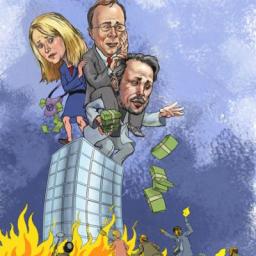CEO pay getting more ire from shareholders
 As stocks of Silicon Valley companies soar and revenues are growing, institutional shareholders are typically reluctant to rock the boat by questioning a company's managers. But some grumpy investors have been sending messages of frugality to maturing tech companies such as Oracle, Salesforce.com and Yahoo, whose executives rake in record-setting compensation packages each year. Their high pay is inviting emerging dissent.
As stocks of Silicon Valley companies soar and revenues are growing, institutional shareholders are typically reluctant to rock the boat by questioning a company's managers. But some grumpy investors have been sending messages of frugality to maturing tech companies such as Oracle, Salesforce.com and Yahoo, whose executives rake in record-setting compensation packages each year. Their high pay is inviting emerging dissent. Now required by the 2010 Dodd-Frank law, "say on pay" measures offer shareholders a chance to be heard in a non-binding vote for or against executive compensation plans. In June, nearly half of Salesforce shareholders thumbed their noses at Benioff's compensation in such a vote. At Yahoo, the board members who recommended Mayer's pay package were quietly hit with a minority protest vote. A McKesson investor and warehouse worker Glenn Gray spoke up at the annual shareholder meeting two years ago, in order to contrast the lavish executive pay at the giant pharmaceutical distributor, with his own low wages and benefits. Shareholders applauded his three-minute speech. He also got fired. But "the poster child for bad compensation" McKesson CEO John Hammergren's annual pay package has declined steadily in recent years.
"Generally, CEO pay is not going down, so activism has not had a tangible effect on overall pay in that respect," said Dan Marcec of Equilar. At the same time, "we're seeing a lot of people get more involved and be more scrutinizing," and boards are responding to demands for prudence by cutting some perks and better justifying others, he said. While there have been steps toward reform, the "level of pay far outstrips what is justified, even by the best performance" at many companies, said Laura Campos.